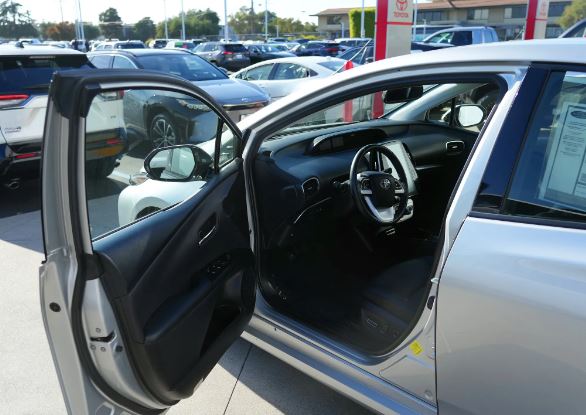While electric vehicles (EVs) captured attention with futuristic technology and visions of a gasoline-free future, hybrids are experiencing a resurgence as EV sales growth slows. General Motors, Ford, and Volkswagen have adjusted their ambitious EV targets due to market realities, and sales of the Toyota Prius, a hybrid standard-bearer, have surged. The enduring reality of 2023 reveals that many Americans are receptive to electrification but not ready to fully embrace EVs.
Electric vehicle sales in the U.S. reached a record 1.2 million in the previous year, constituting 7.6% of new car sales. However, hybrid sales increased even faster, rising 65% to over 1.2 million units, accounting for 8% of the market. This surge in hybrid popularity is attributed to persistent high prices of electric cars and concerns about public charging infrastructure. Hybrid vehicles offer a familiar driving experience with savings at the pump and a reduced need for extensive charging.
Despite a global push towards EVs, mainstream consumers differ from early adopters and are unwilling to pay a premium for electric vehicles, according to Jim Farley, Ford’s CEO. The challenge is to control costs and communicate effectively with consumers. To address this, Ford is adjusting its production plans, increasing output of the more affordable F-150 Hybrid by 20% and quadrupling overall hybrid production. The Maverick compact pickup, especially its hybrid version, has exceeded sales forecasts.
High EV prices and charging concerns are driving consumers to hybrids, especially those unable to charge a battery-powered car at home. Hybrid vehicles offer fuel savings without the need for prolonged charging stops. The smaller and more cost-effective batteries in hybrids contribute to their affordability. On average, buyers paid about $42,500 for hybrids in November, compared to $60,500 for EVs and $47,500 for conventional models.
Leading the resurgence in hybrids are Toyota, Honda, and Hyundai Motor, including the Kia brand. These automakers, responsible for roughly 90% of U.S. hybrid sales, continue to invest in hybrid technology despite commitments from other manufacturers like General Motors and Volkswagen to transition entirely to electric vehicles. The Biden administration’s proposal to make two-thirds of new cars fully electric by 2032 has not deterred these companies from pursuing hybrid options.
Hyundai, Kia, and their Genesis luxury brand collectively outsold every automaker, except Tesla, in electric vehicle sales in the U.S. in 2023. Hyundai Motor remains bullish on hybrids, emphasizing their ability to address emissions concerns, particularly in segments like pickup trucks. Steve Center, Chief Operating Officer at Kia America, predicts that as combustion engine cars fade, remaining gasoline models will adopt electrification in hybrid form to meet consumer and regulatory for emissions.
Toyota, a pioneer in hybrid technology, is set to offer nine hybrid-only models within a few months, underlining its commitment to democratizing hybrid technology. David Christ, General Manager of Toyota’s North American division, expects the company’s electrified sales to exceed 40% by 2024. Christ stresses that while electric vehicles are growing, the charging infrastructure is not ready for mass adoption, contributing to the slowdown in EV sales.
Toyota’s decision to offer the redesigned 2025 Camry exclusively as a hybrid is a strategic move to convert hundreds of thousands of buyers to a fuel-efficient hybrid. While hybrids play a crucial role in reducing gasoline consumption, some experts argue that they are a transitional technology. Long-term climate change goals necessitate a shift to electric vehicles powered by renewable energy. However, hybrids and EVs are not mutually exclusive, both contributing to a reduction in less efficient internal combustion engine vehicles.
As hybrids gain traction, they serve as a valuable tool for millions of drivers to use less gasoline while the industry works towards stricter standards and increased adoption of EVs. While hybrids buy time, the ultimate goal remains a transition to electric vehicles to achieve climate goals and reduce emissions effectively. The automotive landscape is evolving, with hybrids and electric vehicles coexisting to take market share from traditional internal combustion engine vehicles.

